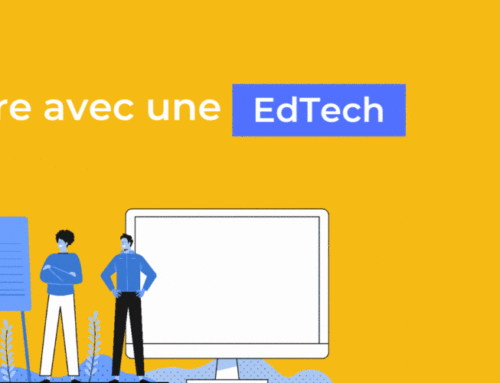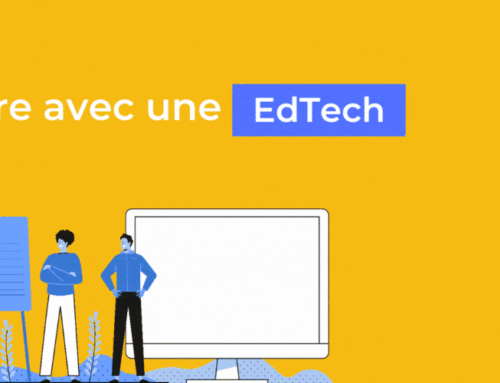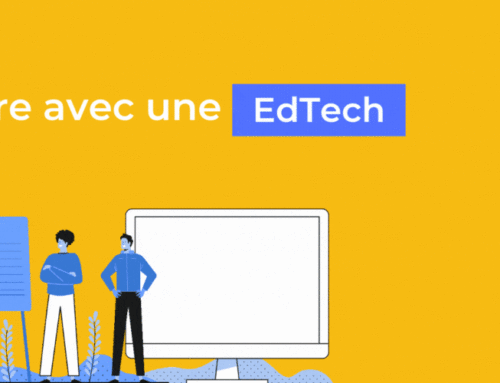
Anne-Charlotte Monneret
General Delegate of EdTech France
EdTech France federates technology companies serving education in France. You work throughout the year with your members to promote the development of the EdTech sector. What propositions do you have for the presidential campaign?
Anne-Charlotte Monneret: We have indeed been interviewed by several teams of candidates, and we come up with concrete propositions throughout the year, but it is true that this period is very important for our ecosystem and for the educational and academic world as a whole.
Some of the propositions for RSE overlap with what we can propose for initial education.
For example, the proposition of creating a Digital Agency bringing together representatives of local authorities, the private sector, the three Ministries (MENJS, MESRI, Labour) and the operators.
This is what happened to conduct an effective digital health policy. This agency could regulate by establishing frameworks and good practices, particularly in terms of security and interoperability, which would facilitate data sharing in a climate of trust, subjects that are particularly crucial for universities, which need to work with each other in a secure and efficient manner.
This agency could also support the national deployment of digital tools and projects within universities in order to develop uses and encourage innovation between institutions.
Another proposal, a Personal Training Account (Compte personnel de formation) for teachers in euros like all employees, complementing the hours of training currently established, in order to support the teaching staff in strengthening their digital skills.
It should also be possible to simplify the access and deployment of innovative solutions detected by DemoEs, and to release additional funding to allow their deployment in all willing institutions.
It is indeed necessary to encourage the institutions to work with edtechs, and for this, the question of the budget is crucial, either by allocating an “edtech” budget, or in the form of a “digital cheque” for each establishment, to be activated with the relevant edtech actors for each educational project.
What do you expect from the presidential candidates’ propositions?
A-C M.: The crisis has highlighted the “flaws” of university policy in terms of digital technology: a widening gap between GAFAMs, which are increasingly present, and edtech digital tools still underused by universities; a lack of training for teachers and support for students; a backlog of infrastructure; major inequalities in access depending on the region; and a lack of acculturation of university elites to the issue of digital technology and its challenges.
Nowadays, digital technology is a way of organizing societies, of circulating information, and of exchanging information between individuals. The University, the foundation of our society, both in terms of content and pedagogical uses and practices, cannot be left out of this process that characterizes and profoundly modifies our societies and our economies.
It is time to bring the French university into the 21st century with a balanced political statement on digital technology, and not to treat the subject only through the prism of “sovereignty”.
This implies integrating digital technology and its pedagogical uses into the heart of teacher training, and promoting the skills and solutions of French EdTech by allowing national champions to emerge.
With two months to go before the presidential election, this means making digital technology a priority for higher education, to enable universities to make a success of their digital transformation, with a view to providing ambitious higher education and equipping each student with solid digital skills, regardless of their course of study.
However, some candidates have made strong points: the importance of student life and well-being at the university (En Marche), the real autonomy of universities to be implemented (Les Républicains), and the ecological and sustainable issues to be taken into account (Y. Jadot). But the Higher Education sector remains particularly missing from the debates and, when it is addressed, digital technology is too rarely the chosen angle…
What do you think French EdTech will look like in 5 years?
A-C M.: Today in 2021, French EdTech represents 10,000 jobs in the country, more than 500 players, and 1.3 billion in revenues.
I dream of a market that is more structured, that is exported with a true recognition of French know-how and French education, of a reasoned and innovative use of artificial intelligence, of Edtech companies that are truly inclusive and take into account accessibility criteria, etc.
I also dream of sovereign and interoperable tools, and of a virtuous use of learning data to better follow students throughout their education.
Finally, I dream of a French Edtech market that is a leader in Europe, at the forefront of innovation, and that attracts the best talent to create the solutions of tomorrow.






